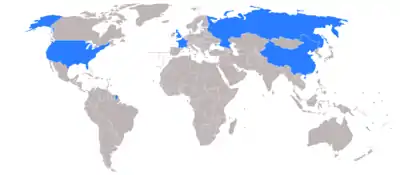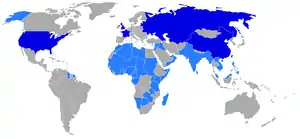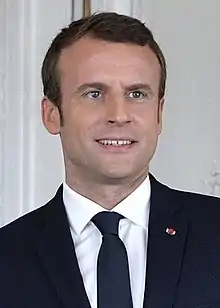Permanent members of the United Nations Security Council
The permanent members of the United Nations Security Council (also known as the Permanent Five, Big Five, or P5) are the five sovereign states to whom the UN Charter of 1945 grants a permanent seat on the UN Security Council: China, France, Russia, the United Kingdom, and the United States.[1]

The permanent members were all allies in World War II (and the victors of that war), and are also all states with nuclear weapons (though not all five had developed nuclear weapons prior to the formation of the United Nations). The remaining 10 members of the council are elected by the General Assembly, giving a total of 15 UN member states. All five permanent members have the power of veto, which enables any one of them to prevent the adoption of any "substantive" draft Council resolution, regardless of its level of international support.[2]
Current permanent members
The following is a table of the current permanent members of the U.N. Security Council.
| Country | Current state representation | Former state representation | Current executive leaders | Current representative |
|---|---|---|---|---|
| President: Xi Jinping[lower-alpha 1] Premier: Li Keqiang[lower-alpha 2] |
Zhang Jun[3] | |||
| President: Emmanuel Macron Prime Minister: Jean Castex |
Nicolas de Rivière[4] | |||
| President: Vladimir Putin Prime Minister: Mikhail Mishustin |
Vasily Nebenzya[5] | |||
| N/A | Monarch: Elizabeth II Prime Minister: Boris Johnson |
Barbara Woodward[6] | ||
| N/A | President: Joe Biden | None |
History


At the UN's founding in 1945, the five permanent members of the Security Council were the French Republic, the Republic of China, the Soviet Union, the United Kingdom, and the United States. There have been two seat changes since then, although these have not been reflected in Article 23 of the United Nations Charter, as it has not been accordingly amended:
- China's seat was originally held by the Nationalist government of the Republic of China (ROC). However, it lost the Chinese Civil War and retreated to the island of Taiwan in 1949. The Chinese Communist Party won control of mainland China and established the People's Republic of China (PRC). In 1971, UN General Assembly Resolution 2758 recognised the PRC as the legal representative of China in the UN, and gave it the seat on the Security Council that had been held by the ROC, which was expelled from the UN altogether.[7] Both the ROC and the PRC continue to claim de jure sovereignty over the entirety of China (including Taiwan).[8][9][10] However, only 15 states continue to officially recognise the ROC as the sole legitimate government of China.
- After the dissolution of the Soviet Union in 1991, Russia was recognised as the legal successor state of the Soviet Union and maintained the latter's position on the Security Council.
Additionally, France reformed its provisional government into the French Fourth Republic in 1946 and later into the French Fifth Republic in 1958, both under the leadership of Charles de Gaulle. France maintained its seat as there was no change in its international status or recognition, although many of its overseas possessions eventually became independent.
The five permanent members of the Security Council were the victorious powers in World War II and have maintained the world's most powerful military forces ever since. They annually top the list of countries with the highest military expenditures; in 2011, they spent over US$1 trillion combined on defence, accounting for over 60% of global military expenditures (the U.S. alone accounting for over 40%). They are also five of the world's six largest arms exporters (along with Germany[11]), and are the only nations officially recognised as "nuclear-weapon states" under the Treaty on the Non-Proliferation of Nuclear Weapons (NPT), though there are other states known or believed to be in possession of nuclear weapons.
Veto power
The "power of veto" refers to the veto power wielded solely by the permanent members, enabling them to prevent the adoption of any "substantive" draft Council resolution, regardless of the level of international support for the draft. The veto does not apply to procedural votes, which is significant in that the Security Council's permanent membership can vote against a "procedural" draft resolution, without necessarily blocking its adoption by the council.
The veto is exercised when any permanent member—the so-called "P5"—casts a "negative" vote on a "substantive" draft resolution. Abstention or absence from the vote by a permanent member does not prevent a draft resolution from being adopted.
Expansion
There have been proposals suggesting the introduction of new permanent members. The candidates usually mentioned are Brazil, Germany, India, and Japan. They comprise the group of four countries known as the G4 nations, which mutually support one another's bids for permanent seats.[13]
This sort of reform has traditionally been opposed by the Uniting for Consensus group, which is composed primarily of nations that are regional rivals and economic competitors of the G4. The group is led by Italy and Spain (opposing Germany), Mexico, Colombia, and Argentina (opposing Brazil), Pakistan (opposing India), and South Korea (opposing Japan), in addition to Turkey, Indonesia and others. Since 1992, Italy and other council members have instead proposed semi-permanent seats or expanding the number of temporary seats.
Most of the leading candidates for permanent membership are regularly elected onto the Security Council by their respective groups. Japan was elected for eleven two-year terms, Brazil for ten terms, and Germany for three terms. India has been elected to the council eight times in total, with the most recent successful bid being in 2020.
In 2013, the P5 and G4 members of the UN Security Council accounted for eight of the world's ten largest defence budgets, according to the Stockholm International Peace Research Institute (SIPRI).
Current leaders of the permanent members
The following are the heads of state and government that represent the permanent members of the UN Security Council as of 2021:
Notes
Footnotes
- The President of China is legally a ceremonial office, but the General Secretary of the Chinese Communist Party (de facto leader) has always held this office since 1993, except for the months of transition. The current paramount leader is President Xi Jinping.
- The de jure head of government of China is the Premier, whose current holder is Li Keqiang.
- Previously President of Russia in 2000-2008.
- President of China since 14 March 2013.
References
- "Security Council Members | United Nations Security Council". www.un.org. Retrieved 21 March 2020.
- [1] Archived 20 June 2012 at the Wayback Machine
- "Ambassador Zhang Jun, PR". chnun.chinamission.org.cn. Retrieved 6 May 2020.
- "Nicolas de Rivière". France ONU. Retrieved 6 May 2020.
- "Постоянное представительство Российской Федерации при ООН". russiaun.ru. Retrieved 6 May 2020.
- "Barbara Woodward DCMG". GOV.UK. Retrieved 9 December 2020.
- Froehlich, Annette; Seffinga, Vincent (2019). The United Nations and Space Security: Conflicting Mandates between UNCOPUOS and the CD. p. 40. ISBN 9783030060251.
- Sarmento, Clara (2009). Eastwards / Westwards: Which Direction for Gender Studies in the 21st Century?. p. 127. ISBN 9781443808682.
- Hudson, Christopher (2014). The China Handbook. p. 59. ISBN 9781134269662.
- Rigger, Shelley (2002). Politics in Taiwan: Voting for Reform. p. 60. ISBN 9781134692972.
- [2] Archived 30 July 2012 at the Wayback Machine
- Sharma, Rajeev (27 September 2015). "India pushes the envelope at G4 Summit: PM Modi tells UNSC to make space for largest democracies". First Post. Retrieved 20 October 2015.
- Sharma, Rajeev (27 September 2015). "India pushes the envelope at G4 Summit: PM Modi tells UNSC to make space for largest democracies". First Post. Retrieved 20 October 2015.
Further reading
- Nico J. Schrijver and Niels M. Blokker (eds.). 2020. Elected Members of the Security Council: Lame Ducks or Key Players? Brill.com.
- GPF Staff (April 2005). "Security Council Expansion—A Regional Model" (PDF). GlobalPolicy.org. Global Policy Forum. Archived from the original (PDF) on 19 May 2009. This is referred to by some as the "Italian Model".

.jpg.webp)



.jpg.webp)